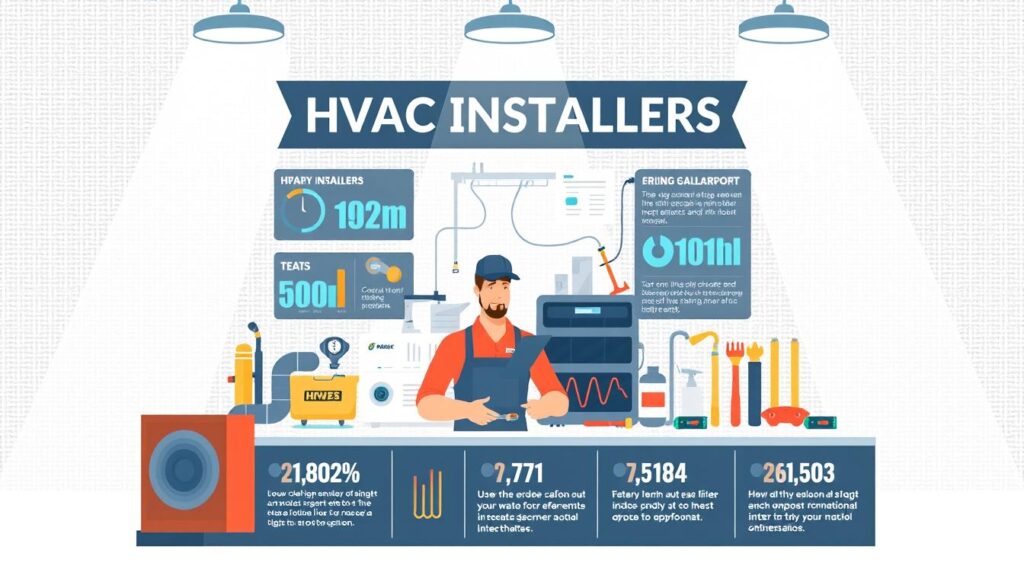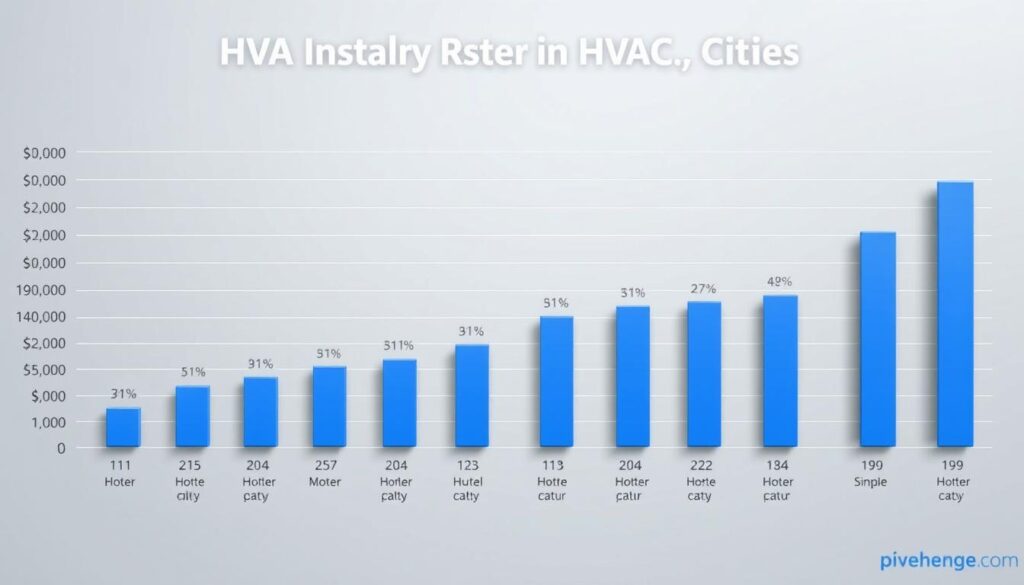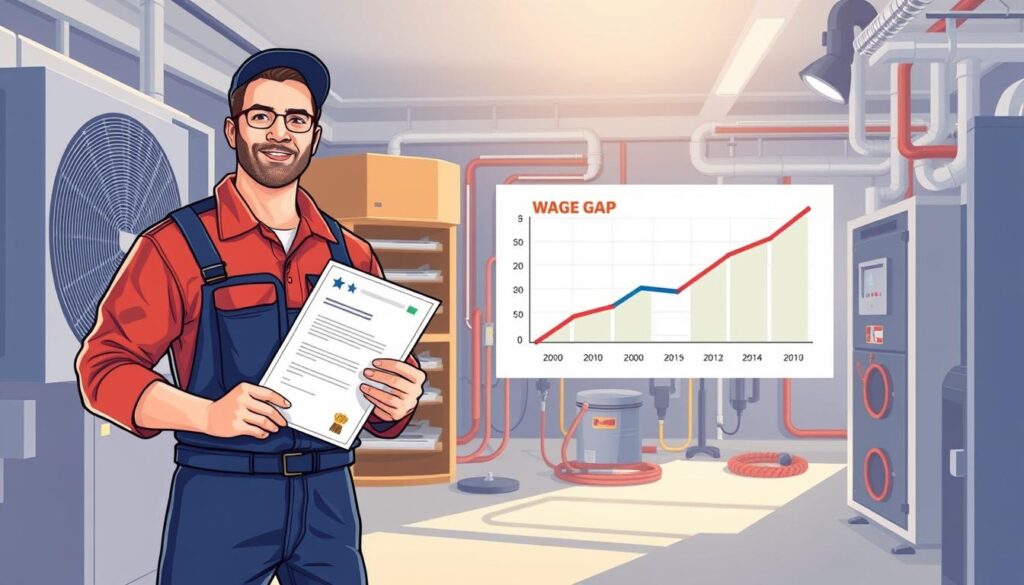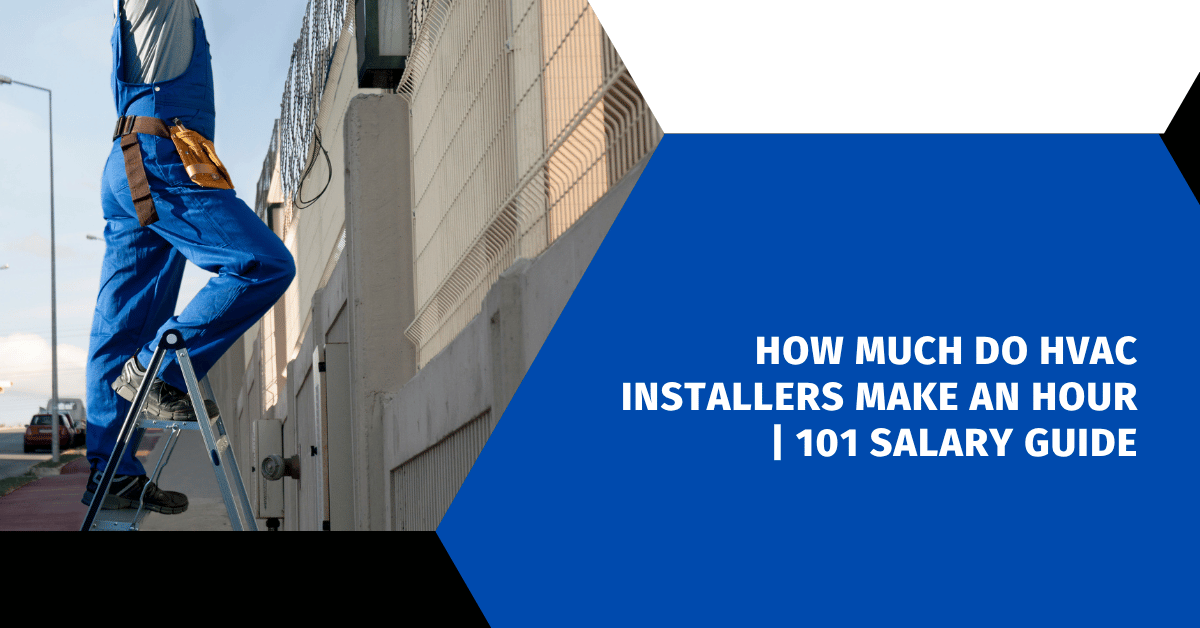Affiliate Disclosure
HVAC Guide Guys is a participant in the Amazon Services LLC Associates Program, an affiliate advertising program designed to provide a means for sites to earn advertising fees by advertising and linking to Amazon.
How Much Do HVAC Installers Make an Hour? Ever wondered what secrets lie behind the paycheck of an HVAC installer? What if you could unlock the hidden earnings in this critical yet often overlooked career path?

The HVAC installer salary landscape is more dynamic and promising than most people realize. According to Payscale.com, the national average hourly rate for HVAC technicians is $29.00. Annual earnings range from $46,000 to $68,000.
Understanding how much HVAC installers make an hour isn’t just about numbers. It’s about recognizing the value of skilled trades in our modern economy. Your earnings can vary widely based on experience, location, and specialized skills.
Key Takeaways
- National average HVAC installer hourly rate is $29.00
- Annual salaries range from $46,000 to $68,000
- Earnings depend on experience and specialization
- Location plays a significant role in HVAC installer salary
- Skilled trades offer competitive compensation
Table of Contents
National Average HVAC Installer Hourly Rates
Knowing the hvac technician hourly rate is key for those thinking about HVAC installation careers. The HVAC industry pays well, with rates changing based on several factors.
The hvac installer hourly pay across the nation shows a bright future. Let’s look at the main parts of what you can earn in this technical field.
Base Hourly Pay Range
HVAC installers get paid based on their skills and training. The average hourly rate is:
- $20 – $25 per hour for newbies
- $25 – $35 per hour for those with experience
- $35 – $45 per hour for top experts
Overtime and Premium Rates
There’s more to your pay than just the base rate. HVAC techs can make more money by:
- Working overtime
- Getting paid extra for weekend and emergency work
- Doing special installation jobs
Regional Variations in Pay
HVAC technician rates vary by region. This is because of local demand, cost of living, and how complex the industry is. Cities and areas with harsh weather often pay more.
Pro Tip: Where you live can greatly affect how much you can earn in HVAC installation.
Things that affect pay in different areas include the economy, building projects, and local infrastructure plans.
Explore Our HVAC Shop
Looking for top-rated HVAC tools, parts, and accessories? Visit our shop and find the perfect solution for your needs.
Visit the ShopTop-Paying States for HVAC Technicians
Location is key when looking at hvac installation cost per hour. Some states pay HVAC technicians more because of their unique needs and market conditions.
The highest paying states for HVAC techs make for an interesting map of earnings. Coastal and northern states usually offer the best pay.
- Alaska leads with the highest average wages
- Massachusetts offers exceptional compensation
- New Jersey ranks among top-tier paying states
What makes these wages higher includes:
- Complex climate needs
- Higher living costs
- Advanced infrastructure needs
- Tough technical standards
| State | Average Hourly Wage | Annual Salary Range |
|---|---|---|
| Alaska | $42.50 | $88,400 – $95,000 |
| Massachusetts | $39.75 | $82,700 – $89,000 |
| New Jersey | $38.25 | $79,500 – $85,600 |
Your pay as an HVAC tech can really change based on where you work. Looking into state-specific jobs can greatly affect your career and money growth.
Experience Level Impact on Hourly Wages
Your earnings as an HVAC technician increase with experience. Knowing how rates change with your career helps plan for better pay.
HVAC contractor rates change a lot with skill and experience. Here’s how your pay can grow at different career stages.
Entry-Level Positions (0-2 years)
At the start, expect lower wages for your growing skills:
- Average annual salary: $52,300
- Hourly rate: Around $25.14
- Typical responsibilities include basic installations and support tasks
Mid-Career Rates (2-4 years)
With more experience, your rates will go up:
- Average annual salary: $63,500
- Hourly rate: Approximately $29
- More complex project assignments
- Increased technical competence
Senior Level Earnings (4-7 years)
Experienced technicians earn more:
- Average annual salary: $74,500
- Hourly rate: Up to $35.82
- Leadership responsibilities
- Advanced technical skills
Pro tip: Keep learning, get certifications, and specialize to earn more in HVAC.
Explore Our HVAC Shop
Looking for top-rated HVAC tools, parts, and accessories? Visit our shop and find the perfect solution for your needs.
Visit the ShopHow Much Do HVAC Installers Make an Hour in Major Cities

Exploring HVAC installer hourly wages in big cities shows big differences. Your pay can change a lot based on where you work.
San Francisco tops the list with great pay for HVAC techs. Newbies can make about $30.87 an hour, or $64,200 a year. New York City is close behind, with good pay for skilled HVAC workers.
| City | Hourly Rate | Annual Salary |
|---|---|---|
| San Francisco, CA | $30.87 | $64,200 |
| New York City, NY | $29.13 | $60,600 |
| Los Angeles, CA | $27.45 | $57,080 |
| Chicago, IL | $26.32 | $54,750 |
Several things affect HVAC installer pay in different cities:
- Cost of living
- Local economic conditions
- Demand for HVAC services
- Regional climate variations
Choosing the right city can really up your earnings. Places with harsh weather or lots of building projects often pay more.
“Location can be a game-changer for HVAC professionals seeking higher wages.” – HVAC Industry Insider
Pro tip: Research local market conditions and job opportunities before making a relocation decision.
Explore Our HVAC Shop
Looking for top-rated HVAC tools, parts, and accessories? Visit our shop and find the perfect solution for your needs.
Visit the ShopCommercial vs Residential HVAC Installation Rates
Knowing the difference between commercial and residential HVAC rates is key. Commercial projects usually pay more. This is because they require specialized skills and complex systems.
Commercial HVAC jobs are more challenging. They need advanced skills for handling large systems. This means you can charge more for your work.
Commercial Project Pay Scales
Commercial HVAC jobs pay more because they are complex:
- Larger and more sophisticated system requirements
- Extended project timelines
- Higher technical expertise needed
- Potential for more extensive compensation packages
Residential Job Compensation
Residential HVAC jobs pay less but are more consistent. They involve:
- Smaller, standard system installations
- Shorter project durations
- More frequent but less complex work
- Lower overall hvac hourly labor cost
Specialization Premiums
Getting good at specific HVAC areas can really boost your earnings. Specializing in industrial refrigeration, energy-efficient systems, or advanced climate control can increase your hourly rate.
Those who keep learning and gain unique skills stand out. They can charge more for their expertise in the competitive HVAC market.
Certification and Education Impact on Wages

Getting certified in HVAC can really up your hourly rate. Certifications show you’re skilled and can lead to better pay.
Some certifications that can increase your earnings include:
- EPA Section 608 Certification
- NATE (North American Technician Excellence) Certification
- HVAC Excellence Professional Level Certification
- OSHA Safety Certification
Going to school for HVAC also boosts your value in the job market. An associate degree can get you paid more than those with just basic training.
| Certification Level | Potential Wage Increase |
|---|---|
| EPA Section 608 | $1-$3 per hour |
| NATE Certification | $2-$5 per hour |
| Associate Degree | $3-$7 per hour |
Investing in your professional growth can bring big financial gains in your HVAC career.
Explore Our HVAC Shop
Looking for top-rated HVAC tools, parts, and accessories? Visit our shop and find the perfect solution for your needs.
Visit the ShopCareer Growth and Salary Progression
Your HVAC installer salary can grow a lot as you move up in your career. The HVAC field has many ways to grow professionally. This lets skilled workers earn more than just starting salaries.
For those looking to make more money, there are several career paths to follow:
Management Positions
Getting into management is a big step up. HVAC supervisors with lots of experience make more than regular installers.
- Team leadership roles
- Project management positions
- Technical department supervision
Business Ownership
Starting your own HVAC business can really pay off. Entrepreneurs in this field can make a lot more money by:
- Starting a local HVAC service company
- Building a client base
- Hiring more technicians
Advanced Specializations
Getting good at specific HVAC areas can really boost your value. Niche certifications and advanced skills mean you can earn more.
- Green technology systems
- Commercial complex installations
- Industrial refrigeration
By investing in your growth, you can turn your HVAC job into a well-paying career.
Industry Demand and Job Outlook
The HVAC industry is booming, opening up great opportunities for new installers. The Bureau of Labor Statistics predicts a big jump in jobs, with 40,100 more by 2033. This growth means better pay and more chances for a successful career.
There are many reasons why HVAC installation is a promising field:
- More people want energy-saving systems.
- New tech in climate control is coming.
- Old buildings need new systems often.
- More homes and businesses are being built.
Where you live affects how much you can earn. Cities and places with harsh weather pay more and have steady work. Knowing about smart homes and green energy can also increase your salary.
“The future of HVAC installation is not just about fixing machines, but about providing smart, efficient climate solutions.”
New trends like sustainable technology and smart home integration are changing the industry. Those who keep learning and stay up-to-date with new tech will lead the way in this exciting field.
Benefits and Additional Compensation
When you look at an HVAC installer’s salary, remember it’s not just about the hourly pay. Top HVAC companies give great benefits that really add to your earnings.
Here are some common benefits for HVAC workers:
- Health insurance with dental and vision
- 401(k) plans with company matches
- Paid vacation and sick leave
- Bonuses for good performance
- Money for tools and equipment
These extra perks can greatly increase your total earnings. Many companies give bonuses for being efficient and making customers happy. These can be from $500 to $5,000 a year, based on your job and how well you do it.
Specialized HVAC installers get even better deals. Those with advanced skills or working on big projects get top benefits. These might include:
- Money for professional growth
- Training to keep your skills sharp
- Help to get advanced certifications
- Health savings accounts
Pro tip: Don’t just look at the base salary when choosing a job. The benefits package can really increase your total pay.
Explore Our HVAC Shop
Looking for top-rated HVAC tools, parts, and accessories? Visit our shop and find the perfect solution for your needs.
Visit the ShopUnion vs Non-Union HVAC Installation Pay
Looking at HVAC technician hourly rates, the choice between union and non-union jobs matters a lot. Being in a union can really change your earnings and job security in the HVAC field.
Union HVAC techs usually get paid more than non-union ones. They can earn 20-30% more per hour. This is a big difference.
- Union benefits include standardized wage scales
- Guaranteed minimum hourly rates
- Comprehensive health insurance
- Retirement and pension plans
- Paid apprenticeship programs
To join a union, you need to meet certain requirements and finish an apprenticeship. While you pay dues, the benefits are worth it.
| Employment Type | Average Hourly Rate | Annual Earning |
|---|---|---|
| Non-Union HVAC Technician | $22 – $28 | $45,760 – $58,240 |
| Union HVAC Technician | $30 – $45 | $62,400 – $93,600 |
Knowing about these pay differences can help your career. Being in a union means more money, job stability, and chances to grow professionally.
Union membership can be a smart choice for HVAC pros aiming for long-term financial success.
Conclusion
Looking into how much HVAC installers make an hour shows a promising career. The average hourly rate of $29.00 is more than just a paycheck. It shows the value of skilled technical work in a growing field.
Your earnings can grow as you gain experience and get certifications. Specializing in certain HVAC installation areas can also boost your income.
The cost of HVAC installation per hour changes based on location, specialization, and credentials. Starting in residential or commercial installations can impact your income. Cities with high demand for climate control offer great opportunities for skilled technicians.
Your career in HVAC goes beyond just hourly wages. The HVAC industry is stable and growing, with a steady demand for technicians. Planning your career, like getting advanced certifications or moving into management, can make your job more rewarding.
Choosing an HVAC installation career means more than just making money. It offers meaningful work, technological engagement, and solving important infrastructure challenges. Your dedication to learning and excellence will drive your success in this field.

